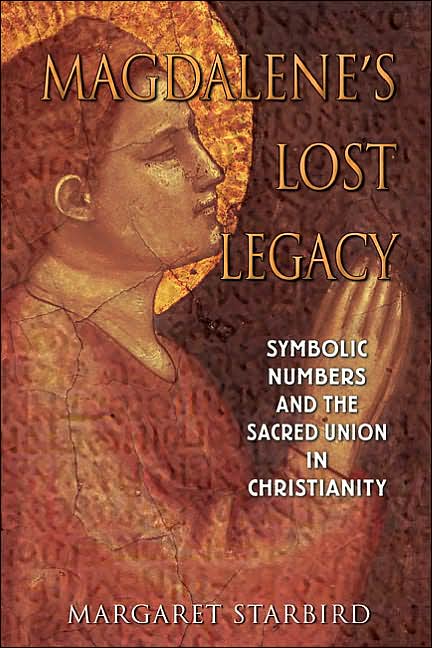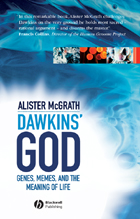 The controversy surrounding Mary Magdalene's relationship to Jesus has gained widespread interest after publication of Dan Brown’s novel The Da Vinci Code, which cites Roman Catholic scholar Margaret Starbird’s works as a significant source. In Mary Magdalene, Bride in Exile Starbird examines the many faces of Mary Magdalene, from the historical woman who walked with Jesus to the mythic and symbolic Magdalene who is the archetype of the Sacred Feminine. Starbird offers evidence that Mary was Jesus’ forgotten bride by sifting through the layers of misidentification under which the story of the Lost Bride of Christ has been buried to reveal the "slandered woman" and the "exiled" feminine principle. Starbird provides an interpretation of Mary’s true role based on the Hebrew scriptures and the testimony of the canonical gospels.
The controversy surrounding Mary Magdalene's relationship to Jesus has gained widespread interest after publication of Dan Brown’s novel The Da Vinci Code, which cites Roman Catholic scholar Margaret Starbird’s works as a significant source. In Mary Magdalene, Bride in Exile Starbird examines the many faces of Mary Magdalene, from the historical woman who walked with Jesus to the mythic and symbolic Magdalene who is the archetype of the Sacred Feminine. Starbird offers evidence that Mary was Jesus’ forgotten bride by sifting through the layers of misidentification under which the story of the Lost Bride of Christ has been buried to reveal the "slandered woman" and the "exiled" feminine principle. Starbird provides an interpretation of Mary’s true role based on the Hebrew scriptures and the testimony of the canonical gospels. In her earlier book, The Woman with the Alabaster Jar, Starbird had used symbolism, history, medieval art, mythology, psychology, and the Bible to find suggestions of a 'marriage' between Jesus and Mary Magdalen. Her investigation of this suppressed history called for a restoration of the feminine principle to its place in the canon of Christianity. Starbird says that her theological beliefs were profoundly shaken when she first read Holy Blood, Holy Grail, a book that suggesested Jesus was married to Mary Magdalen and that their descendants carried on his holy bloodline in Western Europe. Shocked by such heresy, she set out to refute it, but instead found evidence that caused her to come to the conclusion that there is indeed a case to be made for the existence of the bride of Jesus--the enigmatic woman who anointed him with precious unguent from her "alabaster jar." Dan Brown wrote: "Margaret Starbird's work is of particular interest because it fuses the diverse fields of symbolism, mythology, art, heraldry, psychology, and gospel history. Her research opens doors for each of us to further explore the rich iconography of our own spiritual history."
In her earlier book, The Woman with the Alabaster Jar, Starbird had used symbolism, history, medieval art, mythology, psychology, and the Bible to find suggestions of a 'marriage' between Jesus and Mary Magdalen. Her investigation of this suppressed history called for a restoration of the feminine principle to its place in the canon of Christianity. Starbird says that her theological beliefs were profoundly shaken when she first read Holy Blood, Holy Grail, a book that suggesested Jesus was married to Mary Magdalen and that their descendants carried on his holy bloodline in Western Europe. Shocked by such heresy, she set out to refute it, but instead found evidence that caused her to come to the conclusion that there is indeed a case to be made for the existence of the bride of Jesus--the enigmatic woman who anointed him with precious unguent from her "alabaster jar." Dan Brown wrote: "Margaret Starbird's work is of particular interest because it fuses the diverse fields of symbolism, mythology, art, heraldry, psychology, and gospel history. Her research opens doors for each of us to further explore the rich iconography of our own spiritual history." In Magdalene's Lost Legacy, Starbird decodes the symbolic numbers embedded in the original Greek phrases of the New Testament--revealing the powerful presence of the feminine divine. The New Testament contains wide use of gematria, a literary device that allows the sums of certain phrases to produce sacred numbers. (Prose or poetry when combined with music produces 'song'; prose or poetry when combined with numbers produces 'gematria'.) Exploring the hidden meanings behind these numbers, Starbird reveals that the union between Jesus and his bride, Mary Magdalene, formed a sacred partnership that was the cornerstone of the earliest Christian community. Magdalene's Lost Legacy demonstrates how the crucial teaching of the sacred marriage that unites masculine and feminine principles is the partnership model for life on our planet and the ultimate blueprint for civilization.
In Magdalene's Lost Legacy, Starbird decodes the symbolic numbers embedded in the original Greek phrases of the New Testament--revealing the powerful presence of the feminine divine. The New Testament contains wide use of gematria, a literary device that allows the sums of certain phrases to produce sacred numbers. (Prose or poetry when combined with music produces 'song'; prose or poetry when combined with numbers produces 'gematria'.) Exploring the hidden meanings behind these numbers, Starbird reveals that the union between Jesus and his bride, Mary Magdalene, formed a sacred partnership that was the cornerstone of the earliest Christian community. Magdalene's Lost Legacy demonstrates how the crucial teaching of the sacred marriage that unites masculine and feminine principles is the partnership model for life on our planet and the ultimate blueprint for civilization.Margaret Starbird holds a master's degree from the University of Maryland and has studied at the Christian Albrechts UniversitÃnt in Kiel, Germany, and at Vanderbilt Divinity School.
What is your understanding of Mary the Magdalene's role?
Posted March, 31, 2007
 The
The  Evolutionary theorist Richard Dawkins is not an atheist who sits quietly in the pews. Dubbed "Darwin's Rottweiler" he views religion as one of humanity's most pernicious creations. In 'The God Delusion', he attacks arguments for the existence of God; accuses religions of fomenting divisiveness, war, and bigotry and castigates believers in intelligent design. This book parallels themes also expressed by Daniel Dennett and Sam Harris in their books 'Breaking the Spell' and 'The End of Faith'.
Evolutionary theorist Richard Dawkins is not an atheist who sits quietly in the pews. Dubbed "Darwin's Rottweiler" he views religion as one of humanity's most pernicious creations. In 'The God Delusion', he attacks arguments for the existence of God; accuses religions of fomenting divisiveness, war, and bigotry and castigates believers in intelligent design. This book parallels themes also expressed by Daniel Dennett and Sam Harris in their books 'Breaking the Spell' and 'The End of Faith'. Alister McGrath's book 'Dawkins' God - Genes, Memes, and the Meaning of Life' is the first book-length response to Dawkins. His book explains and examines Dawkins' scientific ideas and their religious implications. Head-to-head, it takes on some of Dawkins' central assumptions, like the conflict between science and religion, the "selfish gene" theory of evolution, the role of science in explaining the world, and exposes their unsustainability. Moreover, this controversial debate is carried on in a style which can be enjoyed by anyone without a scientific or religious background.
Alister McGrath's book 'Dawkins' God - Genes, Memes, and the Meaning of Life' is the first book-length response to Dawkins. His book explains and examines Dawkins' scientific ideas and their religious implications. Head-to-head, it takes on some of Dawkins' central assumptions, like the conflict between science and religion, the "selfish gene" theory of evolution, the role of science in explaining the world, and exposes their unsustainability. Moreover, this controversial debate is carried on in a style which can be enjoyed by anyone without a scientific or religious background. Paul Slovic writes in the March 2007 issue of Foreign Policy that people don’t ignore mass killings because they lack compassion. Rather, it’s the horrific statistics of genocide and mass murder that may paralyze us into inaction. Those hoping that grim numbers alone will spur us to action in places like Darfur have no hope at all. Most people are caring and will exert great effort to rescue “the one” whose plight comes to their attention. But these same people often become numbly indifferent to the plight of “the one” who is “one of many” in a much greater problem.
Paul Slovic writes in the March 2007 issue of Foreign Policy that people don’t ignore mass killings because they lack compassion. Rather, it’s the horrific statistics of genocide and mass murder that may paralyze us into inaction. Those hoping that grim numbers alone will spur us to action in places like Darfur have no hope at all. Most people are caring and will exert great effort to rescue “the one” whose plight comes to their attention. But these same people often become numbly indifferent to the plight of “the one” who is “one of many” in a much greater problem.
 The movie 'Amazing Grace' has received very favorable reviews. It is the story of William Wilberforce who in 1785 underwent a spiritual encounter which he described as a conversion experience. He was about to leave politics and devote his life to being a Christian clergyman when he was persuaded by the future Prime Minister of Great Britain to remain in politics with the comment: "Will you use your beautiful voice to praise the Lord or change the world?" Another person from whom Wilberforce received advice was John Newton, a leading evangelical Anglican clergyman of the time, and author of the hymn "Amazing Grace" - hence the title of the movie.
The movie 'Amazing Grace' has received very favorable reviews. It is the story of William Wilberforce who in 1785 underwent a spiritual encounter which he described as a conversion experience. He was about to leave politics and devote his life to being a Christian clergyman when he was persuaded by the future Prime Minister of Great Britain to remain in politics with the comment: "Will you use your beautiful voice to praise the Lord or change the world?" Another person from whom Wilberforce received advice was John Newton, a leading evangelical Anglican clergyman of the time, and author of the hymn "Amazing Grace" - hence the title of the movie.
